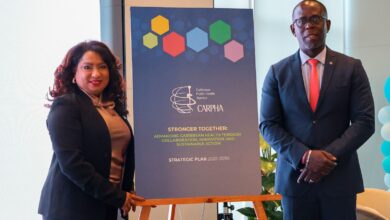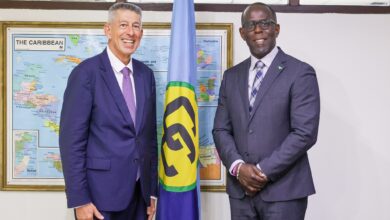I join Madame Chair in welcoming you all to this High Level Advocacy Forum on Statistics.
In the game of cricket, the role of opening the batting has always attracted me. Today, as Secretary-General of CARICOM, I am particularly pleased in this setting and in these opening remarks, to take first strike, knowing full well that there are many top class batsmen to follow.
Like cricket, statistics has been a special interest of mine having been at one time – though a long long time ago – Chief of Economic and Statistics of the CARIFTA Secretariat. I therefore, could hardly turn down the invitation to participate in this High-Level Advocacy Forum on Statistics. Further, when I saw the theme “The Urgency of Statistics and the Global Crisis – Enabling Development in the Caribbean Community: Better Statistics for Better Management and Better Development Outcomes,” I could not but come to the wicket. For this is truly a matter of great importance and urgency for our Caribbean Community.
At the outset I wish to thank those international development partners who, having recognized the importance of this exercise came forward willingly to support it. I speak of PARIS21, the European Union, the United Nations Department of Economic and Social Affairs, Small Island Development States (UNDESA SIDS) and the United Nations Economic Commission for Latin America and the Caribbean (UNECLAC). I must also mention the collaboration the Secretariat has had with the Organisation of Eastern Caribbean States (OECS) and the Standing Committee of Caribbean Statisticians (SCCS) in convening this Forum. Finally, I must thank the Government and people of Trinidad and Tobago for being generous and gracious hosts for this event.
Madame Chair, Ladies and Gentlemen, I have been advised that the objectives of this Forum are the following:
- To gain greater profile for statistics and its crucial role in understanding the magnitude and effect of the global crisis and its impact on the Region;
- To advocate for increased and urgent support to the development of statistics in the Community;
- To engender improvement in the production of statistics in the national statistical systems in CARICOM; and
- To enable the creation of greater linkages between policy and statistics and increased use of statistics by policy-makers and other users.
Importantly, this Meeting will also seek to explore the development of a monitoring framework comprising a coherent set of official statistics that are useful in providing the policy makers and analysts, with an information base to understand the nature of the current global crisis and to monitor and report on the transmission mechanisms that may give rise to systemic risks and vulnerabilities of the Region’s economies.
Such an outcome would be particularly relevant at this time, given that the Heads of Government of the Caribbean Community at their Thirtieth Meeting earlier this month appointed a Special Task Force, led by its Chairman, His Excellency, the President of Guyana and including inter alia, the Prime Ministers of Barbados, Jamaica, St. Vincent and the Grenadines and Trinidad and Tobago, to present, among other things, a core set of proposals for going forward in confronting this economic and financial crisis. It is clear that this team has to be provided with high quality statistics that are complete, timely, relevant, reliable and comparable, to enable an understanding of the crisis and to foster development of the CARICOM Region. Efforts are currently afoot to obtain such data.
This exercise is central to our regional development efforts as all around us the signs are not hopeful. For example, the mainstay of many Regional economies, tourism, has been severely adversely affected with the concomitant loss of jobs and revenue, remittances have declined substantially as a consequence of the unemployment situation in the metropoles, commodity prices in respect of bananas, sugar and rice have taken a downward spiral and there are reports that immigrants are returning to their home countries swelling the unemployment pool because of the grim economic conditions in their adopted countries.
Overall, the indications are that the Global Crisis poses both economic and social threats for the Community for sometime to come.
Even before the crisis, however, there was a growing need for high-quality, timely, reliable and relevant official statistics, to meet the demands of monitoring and informing about globalization and about the establishment and performance of the CARICOM Single Market and Economy (CSME). Such data would relate not only to national income, trade and other economic features but also relating to quality of life issues such as, the incidence ad prevalence of communicable and non-communicable diseases, poverty and the status of the environment.
It is also about leaving a legacy for our future. For how can we plan for the future of our children if we do not even know the extent of the critical issues affecting them today? How can we succeed in building a sustainable region for the future?
The point here is that we not only have to have data, but to have consistent, timely, relevant and accurate statistics.
Our National Statistical Systems are challenged to provide such data especially on a timely basis to help policy-makers to arrive at appropriate short and long-term decisions. In recognition of this deficiency the CARICOM Secretariat, the SCCS and its subgroup, the Advisory Group on Statistics, with the support of International Development Partners, have been instrumental in efforts to support the development of the statistical infrastructure in Member Countries through building sustainable statistical capacity.
Madame Chair, specifically as regard the current financial and economic crisis, the global focus thus far has been essentially on the recovery of the developed and the so-called emerging economies. As a special part of the developing world – the small highly indebted middle-income countries, a group I chose to call the SHIMICS, we have to focus on creating special mechanisms to help us manage the crisis.
In that spirit, the Forum should therefore provide a platform for us to address specific issues for the development of the CARICOM statistical infrastructure, with particular attention to the following:
- The sharing of Regional and National experiences to determine existing priorities and initiatives undertaken, arising from the global crisis;
- Strengthening of inter-agency collaboration for the development of a joint approach to provide the investment and support required for building institutional capacity and infrastructure necessary for the development of statistics in the Region;
- Harmonisation of the methods and practices of the production and dissemination of timely and high-quality statistics; and
- Advancing the production of a core set of pertinent data sets/indicators for monitoring the CARICOM Single Market and Economy (CSME).
The question is, are we in a position to collect, compile, analyse and disseminate the relevant data in a timely manner?
Given that question, the mandates coming out of this Forum should include:
- Advocacy for statistics at the highest levels in the Community;
- The commitment by Member States to invest in statistics as a priority in the Region as a basis for development; Commitments by international and regional organisations to greater resource mobilisation for sustained investment in statistics;
- Strengthening of the linkages between policy-makers and statisticians on the increased use of statistics; and
- A better understanding by statisticians, given the global crisis, on the need to produce and make accessible high-quality statistics.
Madame Chair, Ladies and Gentlemen, if at the end of today’s ONE DAY deliberations, there were to be agreement on these mandates, it would have been more than a day well spent – indeed we would have actually won today’s ONE DAY match – a significant achievement in these days.
Having opened the batting, over to you, the remaining batsmen! I thank you.





